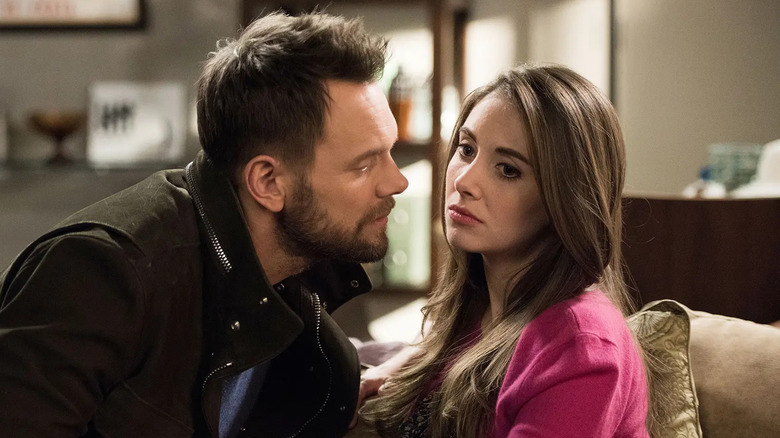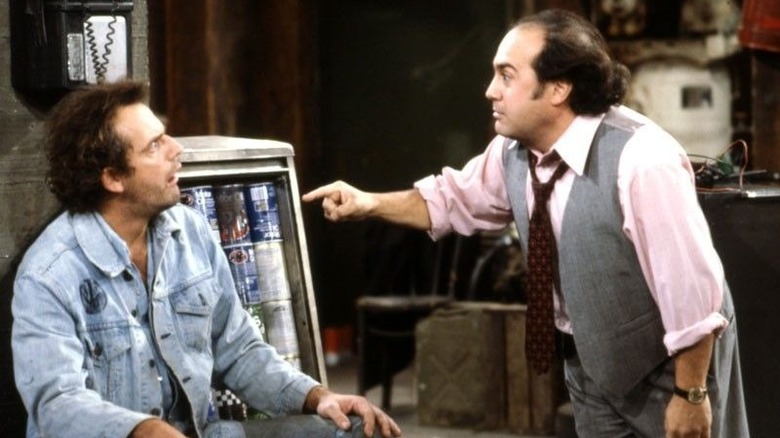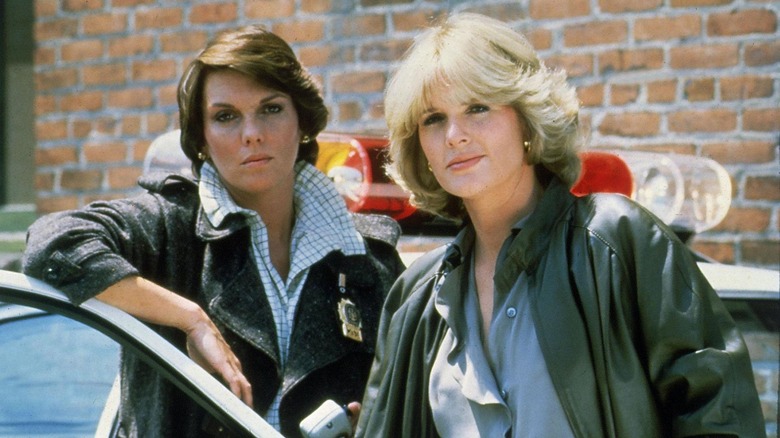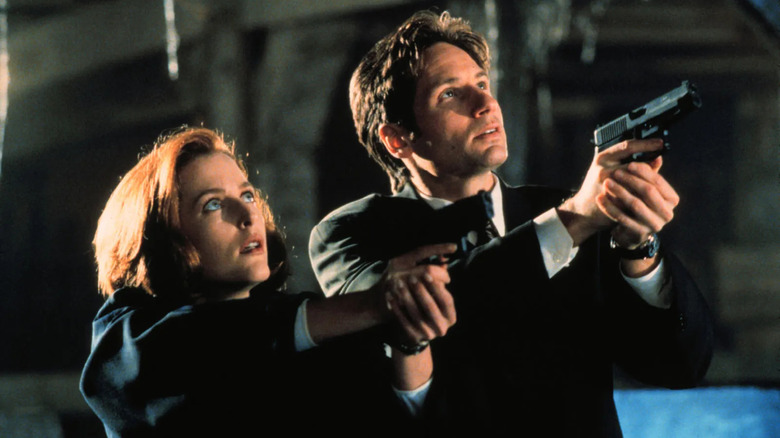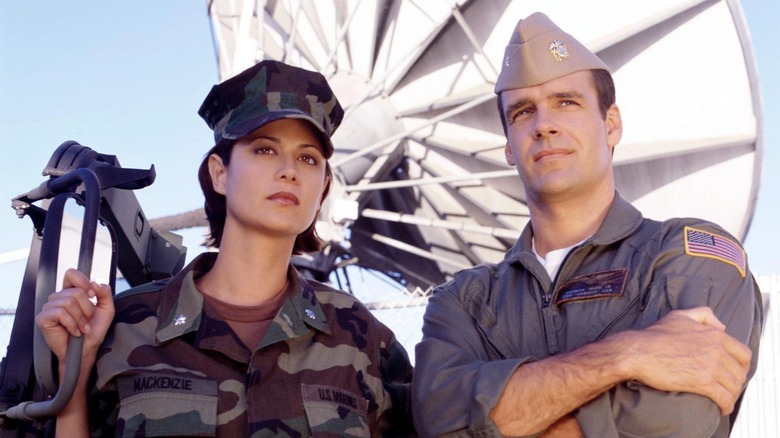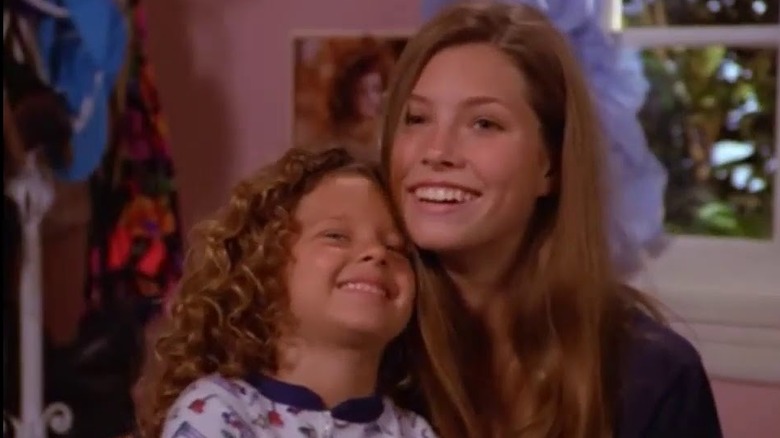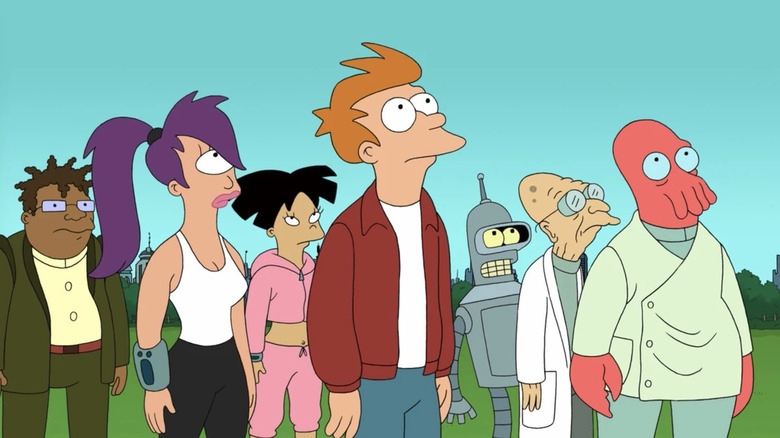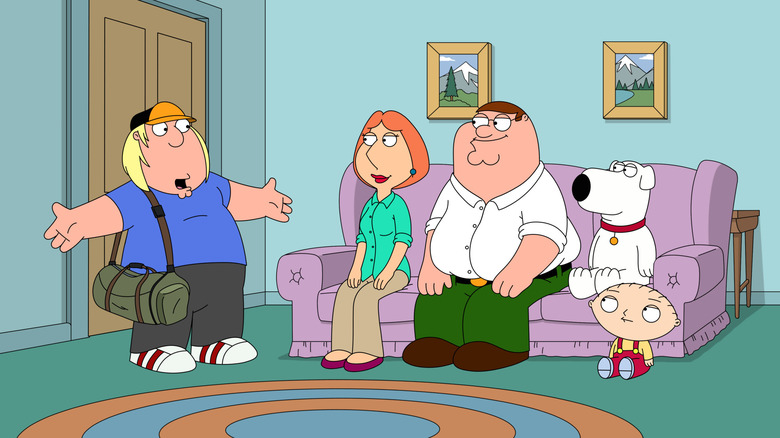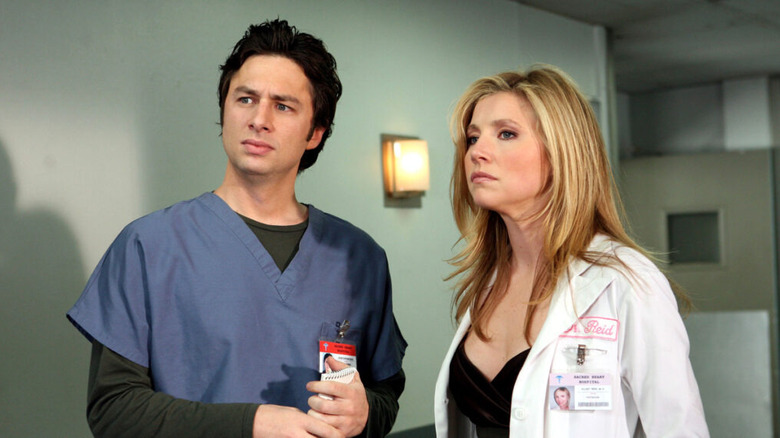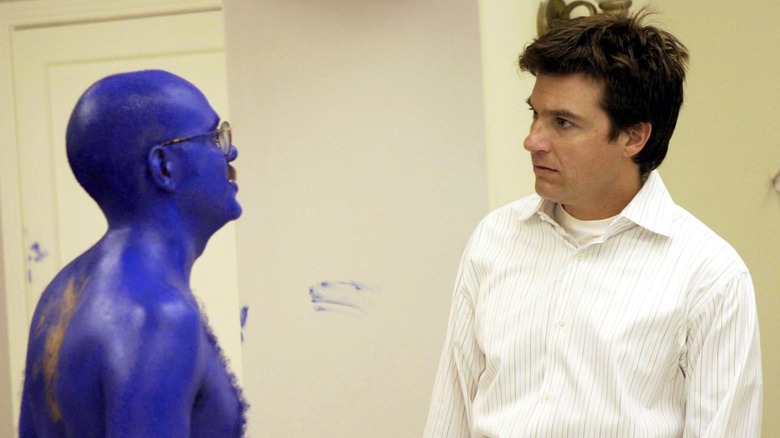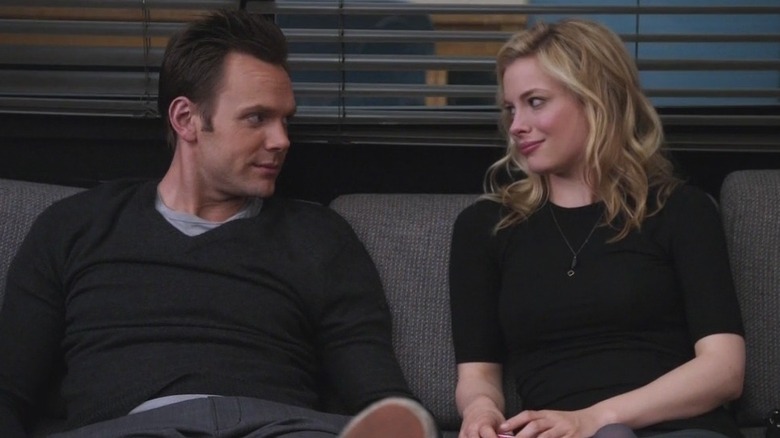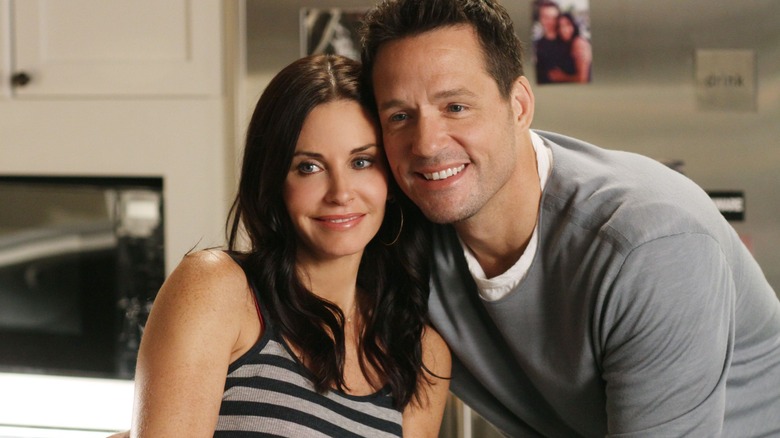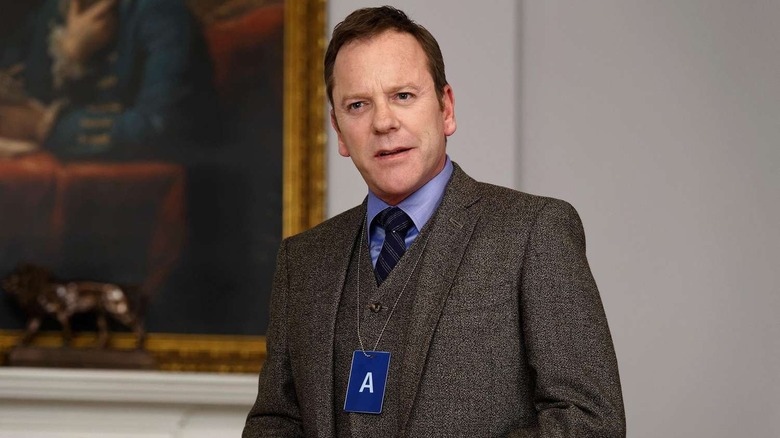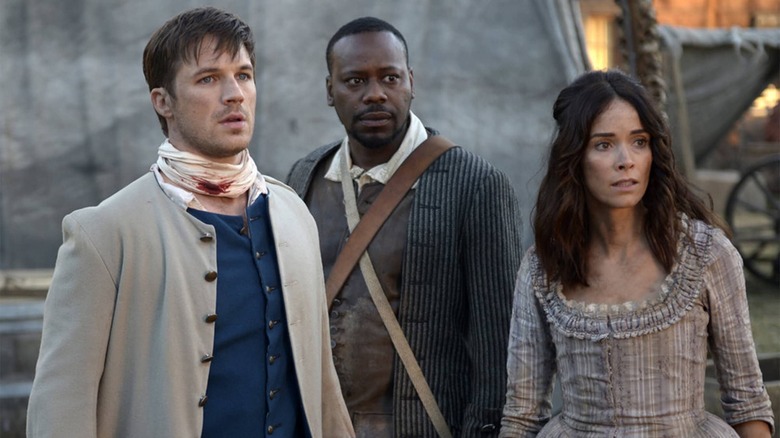TV Shows That Got Canceled More Than Once
Getting picked up by a network or streaming service is a dream come true for many creators. What may have started as a simple pitch or idea eventually grows into a full production, with a cast and crew all committed to making the same idea come to life. This huge achievement doesn't mean its creators can rest easy, however. The entertainment industry is fickle, and the threat of cancelation constant.
Shows that underperform or create controversy get canceled by networks or streaming services all the time, but it's certainly rare that a show gets brought back from the dead. The 15 shows on this list had the potential to succeed and a devoted fanbase to pull them back from the brink. Unfortunately, whatever form they returned in — whether with a different network or with a shuffled cast — most weren't able to maintain the luck for long. While there was once hope for all these television programs to live on past what they had initially expected, time ultimately proved that they weren't meant to go on forever, for better or worse.
Taxi
"Taxi" premiered on ABC all the way back in 1978, featuring a cast of current and future stars of the late '70s and early '80s as a collective of New York City taxi drivers. Created by James L. Brooks, the mastermind behind "The Mary Tyler Moore Show" and "Lou Grant," the show starred the likes of Judd Hirsch, Tony Danza, Danny DeVito, Marilu Henner, Christopher Lloyd, and Andy Kaufman. In hindsight, the show seemed too big to fail, and in reality, it actually was too big to fail.
"Taxi" ran for four seasons on ABC until 1982, racking up Emmy wins and nominations and becoming one of ABC's biggest commercial successes. It seems ludicrous that ABC would ever cancel the program, which was a sentiment echoed at the time, with Brooks telling The Washington Post, "The one thing that's clear from this is that the network is saying to everybody, 'Don't think Emmys will do you any good when it comes to scheduling.'"
After HBO declined to pick up the series, NBC came to the rescue, restoring "Taxi" to its original time slot of Thursday nights following their hit sitcom "Cheers." Sadly, the ratings failed to live up to NBC's expectations, resulting in its second cancelation after only one additional season in 1983. However, most of the cast got to briefly reunite to film re-enactments of "Taxi" scenes with Jim Carrey when the comedian starred in the 1999 biopic "Man on the Moon" as Andy Kaufman.
Cagney & Lacey
Most television audiences became aware of "Cagney & Lacey" as a police procedural that aired from 1982 to 1988 on CBS starring Sharon Gless and Tyne Daly as detectives juggling their complex personal lives with crime-solving in New York City. However, most people only know its resurrected state. It originally debuted as a pilot in 1981 starring Loretta Swit in the role of Cagney alongside Daly, while Meg Foster took over the role when it was ordered to a six-episode first season in 1982.
Following the show's first season, CBS pulled it from their lineup, citing poor ratings and audiences not connecting with the two characters' aggression. This decision by the network resulted in backlash from audiences, while the show's executive producer, Barney Rosenzweig, tried to re-negotiate to get the show put back on the air. Their compromise was to recast Foster with Sharon Gless, who was previously the first choice to play Cagney.
The second season premiered to a rocky start, with the show getting canceled for a second time in 1983, but fan outcry eventually got it picked up for a third season, which saw it receive a boost in the ratings. Gless and Daly proved to be a dynamic onscreen duo, resulting in the show lasting another four seasons before CBS canceled it for good in 1988 after a ratings decline, leaving its Season 7 cliffhanger unresolved. A rebooted pilot in 2018 couldn't get off the ground at CBS (via Deadline).
Baywatch
It's hard to believe that a show like "Baywatch," which continues to hold the record for the most-watched TV series of all time, ever struggled to grab the attention of audiences. Premiering on NBC in 1989, the show starred an ensemble cast featuring David Hasselhoff and Pamela Anderson, who would go later on to become some of the biggest celebrities of the 1990s. However, after its first season aired, NBC quickly put it to bed due to poor ratings and reviews.
However, its syndicated reruns overseas in countries like Germany and the U.K. proved to be a saving grace, as broadcasting company LBS Communications revived "Baywatch" in 1991 with slashed production costs and Hasselhoff taking on a producer credit. "Baywatch" continued to air in its original form for 10 additional seasons throughout the '90s, though after its ninth season in 1999, the show was restructured, recast, relocated to Hawaii, and rebranded as "Baywatch: Hawaii" to save costs.
As one would expect, the massive overhaul of "Baywatch: Hawaii" didn't sit well with audiences at the time, with the show facing a steep decline in ratings until it was canceled in 2001 after 11 seasons. However, the "Baywatch" brand has lived on through spin-off series, as well as a 2017 film starring Dwayne Johnson, Zac Efron, and Alexandra Daddario that was panned by reviewers for many of the same reasons the original "Baywatch" series never garnered critical acclaim.
The X-Files
"The X-Files" was a game-changer for science-fiction television, becoming one of the first shows of the 1990s to gain a cult fanbase through the early internet, and influenced future hit TV series like "LOST," "Supernatural," and "Breaking Bad." Starring David Duchovny and Gillian Anderson as FBI agents investigating paranormal occurrences, "The X-Files" premiered on Fox in 1993 and quickly rose to become the cult phenomenon that it currently is. However, the show didn't maintain its well-deserved praise forever.
The ninth season of "The X-Files," which aired between 2001 and 2002, was victim to a drop in ratings and poor reviews from television critics, who cited the series' lackluster writing compared to its earlier, more inspired seasons. Fox pulled the plug on the series, though its creator Chris Carter blamed the series' cancelation on audiences' unwillingness to watch a show about conspiracies and corruption in the wake of the September 11 terrorist attacks, telling Gizmodo, "There was lots more we could have done but we ended at the right time."
To the delight of many hardcore fans, Fox gave "The X-Files" a second chance in 2016, reviving it for a 10th season with Duchovny and Anderson returning. The two actors also returned for an 11th season, but following its conclusion, Anderson officially parted ways with the show. This brought the series to a premature end for a second time as the creators currently have no intention to continue on without Dana Scully.
JAG
With shows like "JAG," other TV networks see their potential better than the original network that aired them. The legal drama starring David James Elliott and Catherine Bell was created by Donald P. Bellisario, whose TV credits include "Magnum, P.I.," and "Quantum Leap." Upon its premiere in 1995, television critics expected a similar trajectory to happen with "JAG" as with those previous successful series. However, things didn't go so smoothly for "JAG" in the beginning.
After one season on NBC, "JAG" was abruptly canceled by the network, only to be picked up months later by CBS, who offered Bellisario more creative freedom as well as a more mature television audience who could tolerate a more character-driven series than NBC had wanted. Once new episodes began airing in 1997, "JAG" took off in ratings and became one of the most popular shows of the late '90s and early 2000s. After airing for an additional nine seasons on CBS, tragedy struck the production yet again.
Following the end of Season 10 of "JAG," its star David James Elliott announced his intention to move on from the program, which subsequently resulted in its lack of renewal by the network in 2005. However, its final episode's cliffhanger, depicting a coin toss between Elliott and Bell's characters to determine who will resign their career to keep their romance alive, wasn't resolved until Elliott and Bell guest-starred as their characters on an episode of its spin-off, "NCIS: Los Angeles" in 2019.
7th Heaven
"7th Heaven" was a late hit of the 1990s, premiering in 1996 and featuring a cast of future stars including Jessica Biel, David Gallagher, and Stephen Collins. The series, which centers on a Protestant family living in California with seven kids of varying ages, quickly became a hit on The WB network. However, the series was subject to network shake-ups in 2006 after The WB was shut down during a merger with the United Paramount Network to form a new channel: The CW, which would become the future home of hit shows like "Gossip Girl" and "Riverdale."
During the change, The WB canceled "7th Heaven" after 10 seasons, mostly due to the series' high production costs and dwindling ratings compared to The WB's other series like "Gilmore Girls" and "Smallville." Additionally, some of the show's biggest stars, such as Biel or Barry Watson, had left the show in its later seasons and were unlikely to return. However, once the ratings spiked following the announcement of the show's ending, The CW made the surprising decision to pick "7th Heaven" back up for an 11th season to seize on the opportunity.
Sadly, this decision didn't last long at The CW, despite giving it a smaller budget. The series was once again canceled by the network in 2007 after the end of the season. Even the show's cast members have shot down recent queries about a possible revival as recently as 2023 due to controversies amongst some of the other cast members.
Futurama
Matt Groening is best known as the co-creator of "The Simpsons," the simultaneous longest-running animated series and American sitcom on television. However, he garnered a cult fanbase for his second animated series, "Futurama," which premiered in 1999 on Fox. "Futurama" centers on Philip J. Fry, a pizza delivery man who is mistakenly cryogenically frozen and reawakens 1,000 years later in 2999, where he's hired by an intergalactic delivery company alongside an eccentric ensemble of characters.
Compared to "The Simpsons," the life span of "Futurama" on Fox was short-lived due to its inconsistent airtime, resulting in its cancelation in 2002. It wasn't until years later, after the show had accrued a second life through syndicated reruns, that "Futurama" was picked up for its fifth season by Comedy Central, who continued to air it for an additional two seasons after that. However, the show was never on solid ground on Comedy Central, producing several possible series finales until 2013, when its actual finale, "Meanwhile," aired on the network.
Until recently, "Futurama" was thought to be long dead, but the impossible happened in 2022 when Hulu ordered a revival of the series to air on their streaming service. However, this revival news came with controversy after voice actor John DiMaggio threatened to not reprise his role as Bender without a pay raise for the entire cast. Fortunately, DiMaggio is now set to return, with the new season set to air in the summer of 2023. Hopefully this time, it doesn't go away.
Family Guy
The same year "Futurama" premiered, another adult animated series was introduced to audiences, with its own tumultuous production down the road. "Family Guy" was the brainchild of voice actor Seth MacFarlane, centering on the Rhode Island-based Griffin family and their various antics. Its first season was subject to good ratings, but when its second season saw a decline in 2000, Fox abruptly canceled the show, only to revive it for a third season a few months later.
Once "Family Guy" struggled to maintain high ratings for its third season, Fox canceled it yet again in 2002 and sold the rights to Cartoon Network, who began airing reruns of the program on their late-night Adult Swim programming block. It slowly gained more attention from Adult Swim's audiences, and thanks to the additional sales of DVDs, "Family Guy" was revived by Fox for a second time in 2004. Thankfully, MacFarlane kept an optimistic outlook about the show's ups and downs, telling the Calgary Sun, "We really wanted to keep the show exactly as it was."
Since its fourth season return in 2005, "Family Guy" has remained a staple of the Fox network and a consistent success. As of 2023, "Family Guy" has aired a total of 21 seasons, and MacFarlane has remained a part of the show's voice cast while pursuing projects like "American Dad!," "The Orville," and directing comedy films like "Ted" and "A Million Ways to Die in the West."
Scrubs
Before Bill Lawrence created hit shows like "Ted Lasso," "Clone High," and "Shrinking," he was known by most television audiences as the mind behind "Scrubs." Debuting on ABC in 2001, "Scrubs" starred Zach Braff as J.D., the daydreaming medical intern at Sacred Heart Hospital, who pines for his fellow intern Elliot Reid, played by Sarah Chalke. The show's early seasons were beloved by critics and fans alike, with Entertainment Weekly saying of it in 2006, "[it] would be a big annoying mess if it weren't done just right."
However, "Scrubs" hit a brick wall when the Writers' Guild of America went on strike from 2007 to 2008, short-changing its seventh season by seven episodes and ultimately dooming it to cancelation due to production being stalled. After a period of not knowing if "Scrubs" would get to continue airing, ABC picked the show up for its eighth season. While this would be seen as a victory by some, it would soon become bittersweet when it was announced that Braff intended to depart from the show's main cast at the end of the season.
"Scrubs" returned for its ninth season in 2009, featuring a predominantly new cast of medical students at Winston University. Though Braff appeared in six of the season's 13 episodes, fans were adamantly opposed to the vast changes in the show's formula. Eventually, ABC announced that "Scrubs" was canceled in 2010, with Braff telling his Facebook followers, "It was worth a try, but alas... it didn't work."
Arrested Development
Thankfully, the world of Internet meme culture has kept "Arrested Development" alive longer than any network could. Created by Mitch Hurwitz, "Arrested Development" premiered on Fox in 2003, led by Jason Bateman's Michael Bluth, the son of a corrupt real estate developer who struggles to keep his family of narcissistic, delusional, and financially struggling socialites together. The show boasted one of the strongest ensembles in TV history, including David Cross, Will Arnett, and Jessica Walter, as well as up-and-comers Alia Shawkat and Michael Cera.
After three seasons of low ratings on Fox, "Arrested Development" was canceled by the network, but Hurwitz was determined to find a second home for the series. After years of failed starts and rumors of a film, "Arrested Development" was finally revived by Netflix, which aired a fourth season in 2013 featuring the entire returning cast. However, due to the conflicting schedules of the show's cast, the season was structured to make each episode focused on an individual character, with plotlines intersecting throughout the episodes.
"Arrested Development" remained dormant for many more years after the divisive fourth season. It wasn't until 2018 that the show finally returned for the first half of its fifth season, with a second half released in 2019. By this point, tensions off-screen became tiresome for the cast, including an incident of Jeffrey Tambor's abusive on-set behavior. That, mixed with the unfortunate passing of Walter in 2021, means that "Arrested Development" is probably dead for good.
Community
Although "Community" captured a dedicated fanbase from its very first episode, behind the scenes the show struggled to stay on the air. The NBC sitcom premiered in 2009, starring Joel McHale as an ex-lawyer forced to attend community college to regain his license, where he befriends a study group of misfits and outcasts in an ensemble including Gillian Jacobs, Alison Brie, Donald Glover, and Chevy Chase. The show was created by future "Rick & Morty" co-creator Dan Harmon, who was the main catalyst for the show's off-screen troubles.
After a public feud with Chase over disagreements with the show's direction, Harmon was fired from season four of "Community," only to be rehired after Chase himself was fired for an on-set racist tirade. Harmon returned for season five of "Community," but by that point it was too little too late, and "Community" found itself on NBC's chopping block in 2014. However, after adopting the tagline "Six seasons and a movie" from a previous episode, fans were determined to find the sitcom a new home.
"Community" found its saving grace in Yahoo! Screen, which ordered a sixth season of the show, though by this point both Glover and Yvette Nicole Brown had departed from the cast, with others eyeing their post-"Community" futures. Although some involved insisted that "Community" was not canceled, Yahoo! Screen shut down in 2016, canning the series' future. To the delight of all "Community" fans, the long-awaited movie was finally confirmed to be happening on Peacock in 2022.
Cougar Town
"Cougar Town" marked a triumphant return to the sitcom format for Courteney Cox, who rose to fame by playing Monica on NBC's "Friends" from 1994 to 2004. On "Cougar Town," Cox plays Jules, a recent divorcée re-exploring dating in her 40s, with an ensemble of her friends played by Dan Byrd, Busy Philipps, and Christa Miller. The show, which was created by "Scrubs" showrunner Bill Lawrence and co-created by Kevin Biegel, premiered on ABC in 2009, though faced many setbacks in its run, including producers requesting a name change, though nothing stuck as well as "Cougar Town."
Its biggest setback, however, came after the third season, when ABC removed it from their mid-season schedule, priming the producers for a potential cancelation. These predictions came to fruition, but "Cougar Town" was thankfully saved by TBS, who picked it up for a fourth season in 2013, and then subsequently renewed it for a fifth and sixth season. Sadly for fans of the single-camera sitcom, TBS opted to end its renewals after the sixth season, rendering that the final season of "Cougar Town" after it finished airing in 2015.
Though the show was more adequately prepared than most for its series finale, that doesn't mean the cast wasn't disappointed that the show wouldn't continue on TBS. As Josh Hopkins, who played Grayson in the show, told Variety, "I'm going to miss seeing those people every day, but I just think what a great experience it was, rather than be sad that it's over."
Nashville
"Nashville" premiered on ABC in 2012, centering on Hayden Panettiere as a rising country star, Juliette Barnes, who threatens the power of Connie Britton's Rayna James. The show has powerful talent behind it, as it was created by Callie Khouri, the screenwriter behind the Academy Award-winning film "Thelma & Louise." The biggest draw to "Nashville," naturally, was its music, which included original songs and covers that were distributed by Big Machine Records, the same Nashville label that formerly supported Taylor Swift's rise to country stardom in the early 2000s.
Sadly, "Nashville" was abruptly canceled by ABC after its fourth season. The announcement came shortly after ABC confirmed that the show would be heralded by new showrunners, which had cued television pundits that the show would be renewed for a fifth season. However, the renewal didn't come quickly, so the show's fans resorted to an online campaign to bring the show back to life after many were disappointed at where the fourth left the series off. The show was revived on the CMT network in 2016, a more than appropriate home for the show.
Season five of "Nashville" premiered in 2016, but fans were even more shocked by the series' turn of events, which saw Connie Britton's character killed off in the first half of the season. Though the show was renewed for a final sixth season which aired in 2018, CMT opted to not keep it going beyond that point.
Designated Survivor
The future seemed hopeful for "Designated Survivor" when it began. Starring Kiefer Sutherland as a man designated as next-in-line for the U.S. presidency after a terrorist attack kills everybody ahead of him in the line of succession, the show premiered in 2016 on ABC with lots of network support behind it. Rather than have a pilot ordered like most shows typically do, "Designated Survivor" was ordered straight to series, and was renewed for a second season within a week of its first season finale airing.
However, in a business decision almost as jarring as the show's initial order, ABC abruptly canceled "Designated Survivor" in 2018 after a high turnover of showrunners and difficult production scheduling failed to meet the network's expectations. However, Netflix opted to renew the show for a third season themselves, as they had already handled the distribution of "Designated Survivor" to international markets.
Following its third season, Netflix ultimately made the decision to not renew "Designated Survivor" any further, with the company thanking Sutherland and the crew for "[crafting] a compelling and satisfying final season," (via Deadline). Its cancelation was announced the same day as Netflix's "Tuca & Bertie," which was itself revived by Adult Swim (who went on to cancel the animated series a second time in 2022), though "Designated Survivor" wasn't lucky enough to share a similar fate and be revived beyond the second chance that Netflix gave it. However, most fans of the series are more than satisfied with how it ended.
Timeless
As far as network science fiction television shows go, "Timeless" had quite an interesting premise, focusing on a trio played by Abigail Spencer, Matt Lanter, and Malcolm Barrett traveling through time to stop a terrorist organization from altering historical events. The show's production team included executive producers of the James Spader-led hit "The Blacklist," also on NBC, but sadly the network wasn't as loyal to them with this series, as "Timeless" was eventually canceled by the network after the end of its first season.
"Timeless" sadly suffered from poor ratings during its run on NBC. Despite this, fans clamored for the show to be revived by another network, but to the surprise of the series' creators, "Timeless" was renewed three days later by NBC themselves, albeit with a downsized episode order at only 10 episodes. However, this revival didn't last long, as NBC canceled the show yet again in 2018 after the second season ended.
This time around, "Timeless" fans didn't have to wait too long to see the series properly conclude. In their second change of mind, NBC ordered a two-part finale to wrap up the series, which aired as a Christmas special in 2018 and featured the time-traveling trio rewinding to the Hungnam evacuation during the Korean War, which occurred during Christmas 1950. Thankfully, this two-part finale was more than enough for fans to say goodbye to the series that ran longer than NBC wanted it to.
